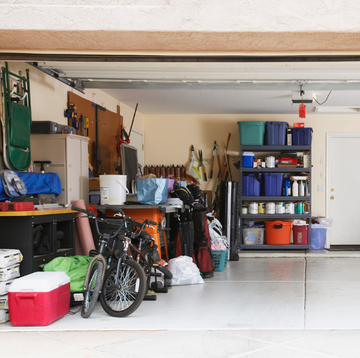There was a time, earlier in my marriage, when every morning as I walked into the kitchen I braced myself for the rage and resentment that would well up in me.
Cupboards left open. Dirty dishes in the sink. Coffee cups strewn around the house. And usually a pair of slippers or shoes, with inside-out socks, on the floor somewhere nearby.
Even when I had left the house spotless the night before, I’d wake to a scene of disarray — the mess my husband had left behind on his way out the door for work.
I didn’t know which scenario seemed worse, my husband’s consciously expecting me to clean up these messes or his truly not noticing them at all. I found myself silently tallying these small resentments, furious and flummoxed in turn that he seemed oblivious to things that needed to be tidied up around the house. It seemed as if he was always waiting for me to tell him what had to be done, as if he was incapable of noticing the mess himself even when he was creating it. A friend had a similar complaint: the ever-growing pile at the bottom of her stairs. Laundry, toys, a new package of toilet paper — anything and everything that needed to go upstairs would get piled on the bottom step, waiting for someone (her) to take it all up. Her husband would step over the pile God knew how many times, even after it had become a true obstacle. Did he really not see it?
When Stereotypes Stick
Women are often told that men just don’t see mess the way they do, and anecdotal evidence can seem to back that up. But it’s not a difference in brain chemistry that accounts for this selective blindness; it’s the way we’re socialized to react to mess and clutter that causes the difference in feelings of responsibility for keeping the home tidy.
Crystal Britt, L.C.S.W., cohost of the podcast Time to Lean, explains that this socialization starts so young that differences in mess perception feel “natural” by the time people reach adulthood. “We say things like ‘Boys are just messier,’ and we don’t expect boys to have good hygiene, which is just one of many harmful stereotypes that aren’t necessarily true,” Britt says. Over time, however, these stereotypes can become the truth.
Britt explains that even when boys naturally tend toward being clean, that tendency is sometimes socialized out of them because “cleanliness,” especially as related to home making, is seen as too proximal to femininity. “Even if they do care about being tidy, boys learn to feel self-conscious about caring,” Britt says. “Men and boys aren’t supposed to be invested in keeping things organized because it could cost them socially, so they will condition themselves not to notice messiness or to act like it is not a big deal.”
In specific circumstances, the opposite can also be true: Men often tend more toward noticing and controlling the cleanliness of the home if they’ve been involved in the military, policing or any other hypermasculine job that reinforces order. The mental load of many other things may fall to their partners, but because cleanliness for these men is a core value tied to masculinity, it is allowed to be important to them.
Another reason for the discrepancy: It becomes easier for someone to let mess become invisible when their partner is quick to deal with it. The tendency to have one partner be the one to notice and control the cleanliness of the home can cause major relationship resentment. Even with the genders flipped or in a same-sex partnership, there are few scenarios in which one partner wants to feel constantly responsible for cleaning up after the other.
In heterosexual couples, mess is most commonly hyper-visible to women because of their socialization and conditioning. Women’s worth is often unconsciously tied to the home, with them knowing that they, rather than their partners, will be criticized for any clutter.
Author and psychologist Tracy Dalgleish, Ph.D., highlights the power of internalized gender norms that show up as “shoulds.” “Women are socialized to internalize the belief that they ‘should’ be the ones to carry the mental load of caring for the household and the relationship and doing child care,” she says. Dalgleish explains that men don’t always register the impact mess has on the family — a pattern that, across two decades of clinical practice with couples, she’seen cause strife.
“We’ve internalized these messages of mom guilt for so long that we don’t even need others to surveil us anymore — we surveil ourselves,” says Erica Djossa, an author and the founder of Momwell. “The idea of being messy as a mom, or not being able to organize everything perfectly or even stay on top of the laundry, brings up strong ‘shoulds’ — namely, that we should be good at these things and know how to do them.”
A Simple Fix?
The good news is that we can unlearn our conditioning and make intentional choices about how we want to approach mess in our homes. That can mean examining where expectations for the home come from and releasing the ones that don’t serve us, or it can mean noticing our blind spots if we tend to ignore the mess because our partner cares more than we do.
When creating shared standards to communicate to your partner, Djossa advises that you ask yourself, Are these standards functional for my family and me, or are they perfectionist or connected with an idealized aesthetic? Keep what works well and be able to articulate to your partner why it does, and be open to new ideas as you collaborate to build a life that works for both of you. It’s also important that your partner learn to be more tuned in if they’re used to shirking the mental load.
No one should wait to be told what needs doing; there need to be clear expectations about how each of you will respond to mess — and your responses should be equal in both timeliness and effort. The burden shouldn’t all fall on you because what’s not done bothers you more; your partner should be willing to show up in equal measure for your shared life.
Dalgleish says, “Each partner should avoid focusing on what their partner is or isn’t doing. Instead of saying, ‘You never deal with this mess! It’s all on me!’, a more effective approach is sharing what is happening for you — for example, ‘I’m overwhelmed, and I need us to find a new solution together.’ ”
That collaboration can lead to new ideas that allow both partners to take on equal responsibility in dealing with the mess. The goal is to make the invisible visible. Noticing what needs to be done isn’t mind-reading; it’s being attuned to the daily rhythms of life and home — a skill all of us can, and should be able to, share.
“While the conversation might be about ‘mess,’ ” explains Dalgleish, “it often signifies attachment needs and core longings, which sound like, Am I important enough for you to see that this matters to me?”
Kitchen Clarity
I realized that many of the resentments that were building up in me were things my husband didn’t realize bothered me (though a little voice inside me still wants to scream, Seriously?!). I began pointing out how his behavior affected my day, such as that the undone dishes made me feel behind and that when I found his slippers and socks on the floor, it felt as if he expected me to clean up after him.
His response? He didn’t want to wake me or the kids with the noise of doing dishes; he was putting his shoes on just before leaving so his footsteps would be quiet. The issue wasn’t that he didn’t care; it was that our lack of communication left him caring about the wrong things. When he understood what actually mattered to me, he adjusted his behavior. Does the sound of him doing the dishes sometimes wake me up now? Sure, but I fall back asleep soon enough, content that he cares enough to show up for me in the ways in which I ask him to.
This story originally appeared in the September 2024 issue of Good Housekeeping.

















